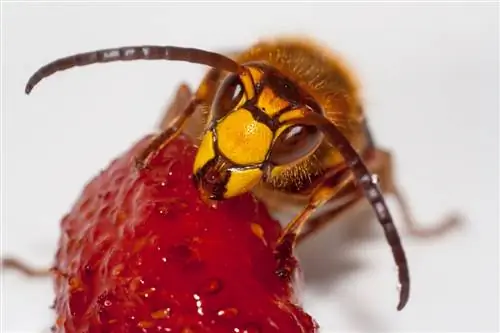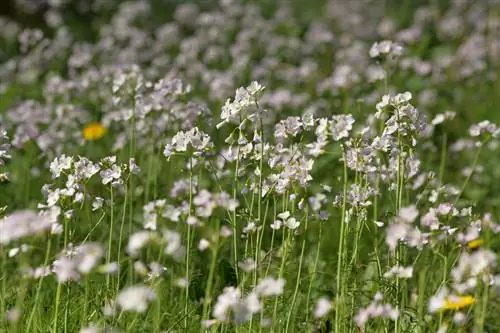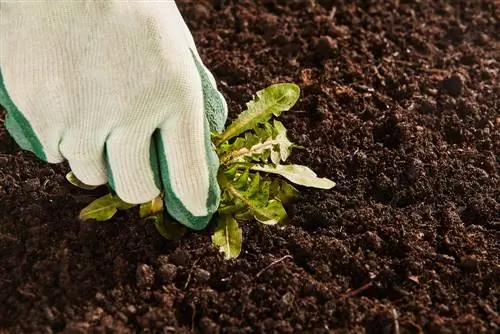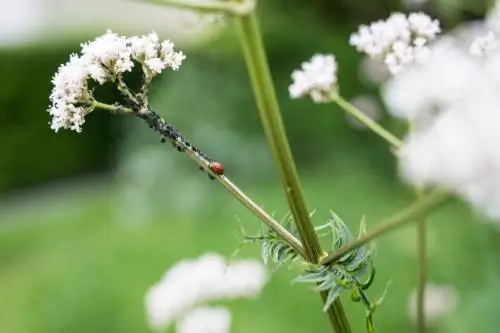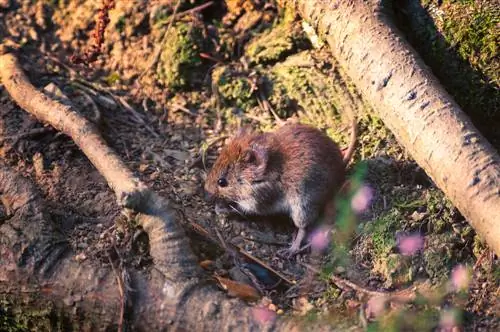- Author admin leonars@hobbygardeners.com.
- Public 2023-12-24 06:09.
- Last modified 2025-06-01 06:02.
Hornets are the largest native wasp species and are often found in the garden or on the terrace. You are not allowed to catch or kill the animals because they are protected. However, you have a few options to get rid of them using gentle means.
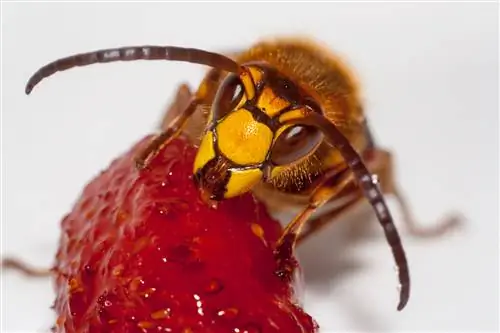
How can you get rid of hornets effectively?
To effectively drive away hornets, use strong smells such as clove oil, lemons, garlic or coffee. Plant fragrant plants such as lavender, basil, tomatoes, mint and lemon balm. Avoid tempting scents, light sources and fallen fruit. However, do not harm the animals as they are protected.
Be careful, fine! Killing hornets is not allowed
“Hornets have become rarer and are threatened with extinction. Since they hardly attack humans, they are by no means as dangerous as is usually assumed.” (from: “Diseases of Bees” by Enoch Zander)
Hornets scare many people simply because of their size, especially since the old saying “Five hornet stings kill a horse, three kill a person ()” is still haunting some people's heads. So it's no wonder that the hornet's nest needs to be moved or that people are frantically trying to drive the animals out of their garden. But be careful: According to the provisions of the Federal Nature Conservation Act, hornets are protected by law and may neither be caught nor killed. This not only means that you are not allowed to kill the individual animal at the coffee table with the heel of your shoe, but removing hornet nests is also prohibited. In the event of a violation, the authorities may fine you up to EUR 50,000.
Distribute hornets legally - you have these options
However, you are allowed to drive hornets out of your home or garden as long as the animals are not harmed. There are a few simple options and resources available to you, which we will introduce to you here. In addition, you don't need to be afraid of hornets: the animals are peaceful and are more likely to avoid confrontations than attack you. In addition, although a hornet sting is painful, it is no more poisonous or dangerous than any other insect sting.

Avoid and eliminate attractants
Hornets are attracted by certain smells. If you keep these scents under wraps or eliminate the sources that cause them, then the animals won't get lost in your garden in the first place. Hornets find these smells particularly irresistible:
- Juicy trees: Adult hornets feed largely on insects and drink tree and plant juices. In particular, the sweet tree sap of particularly sap-rich species such as lilac, willow, ash or birch attracts the animals, so they often settle near these food sources.
- Fallen fruit: The same applies to sweet apples, pears and other fallen fruit that do not attract wasps and hornets in the summer months. Hornets not only drink from the plant sap, but also like to eat the wasps that live there. Above all, collect stone fruit, but also grapes and apples, in good time so that they do not attract insects in the first place.
In addition, the hornets, which are also active at night, like so many insects in the dark, turn to any light source. Therefore, avoid having lights on permanently in the garden. This also includes doing without the solar lamps that have been so popular for some time.
Tip
Instead of cutting down beautiful and he althy trees, you can also rub their trunks with a scent that is unattractive to hornets. Clove oil, for example, is very suitable for this. This measure makes sense if hornets return every year and you want to get rid of them permanently.
Repel hornets with scents
Just as hornets are attracted to some scents, they are repelled by others. The animals can be driven away very well with the following smells:
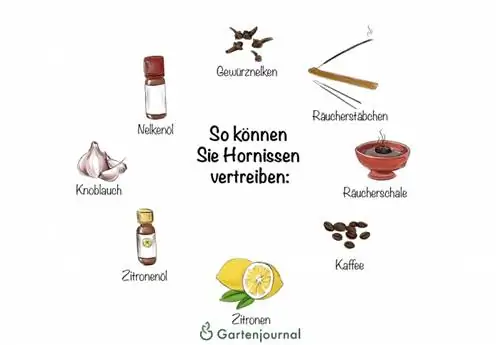
| Medium | Application |
|---|---|
| Clove oil | drip into scented bowls and place on the terrace or windowsill |
| Cloves | crushed and placed in vulnerable places together with lemon peel or oil |
| Incense sticks | burn on the windowsill or coffee table |
| Incense bowl | place in vulnerable places |
| Coffee | Either drink hot, fragrant coffee or light coffee powder and burn it down |
| Lemons | cut open and distribute strategically |
| Lemon oil | drip into scented bowls and place on the terrace or windowsill |
| garlic | cut open and distribute strategically |
The remedies mentioned are very suitable for keeping hornets out of the apartment or the coffee table on the summer terrace. Of course, they are not a panacea because some hungry animals find the delicious smells more attractive than the unpleasant smells more repulsive. But clove oil in particular always proves to be very effective, even against other species of wasps such as the much more annoying common wasp (Vespula vulgaris).
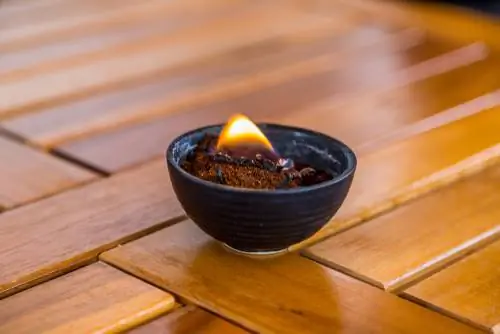
Burning coffee powder is said to keep hornets, wasps and mosquitoes away
Some plants help against hornets
Some plants that smell very pleasant to us are also wonderful for driving away or keeping away hornets. Place them in strategic locations in the garden (for example next to the lilacs) or plant them in pots around the terrace or on the windowsill. Unless the hornet's nest is in the immediate vicinity, the animals will give the plants in question a wide berth. The following types are best suited:
- Basil (bot. Ocimum basilicum)
- Lavender (bot. Lavandula angustifolia)
- Peppermint and other mints (bot. Mentha × piperita)
- Tomatoes (bot. Solanum lycopersicum)
- Frankincense plant (bot. Plectranthus coleoides)
- Lemon balm (bot. Melissa officinalis)
All of these plants can be easily cultivated in pots and other planters and can even be used in the kitchen and for other purposes. A bag of dried lavender, for example, provides a pleasant floral scent in the wardrobe and keeps clothes moths away.
Distract instead of driving away
If there is a hornet's nest in the garden and you don't want the animals to constantly fly onto the terrace, you can distract them using simple means if necessary. Place delicious lure food in the form of ripe fruit in a strategic location not far from the nest - and as far away as possible from busy places such as a children's playground. Apples, pears, grapes and stone fruits (such as peaches and nectarines, plums and cherries) in particular attract hornets. To make the sweet scent more intense, it is best to cut the fruits open and place them on flat bowls.
Be careful with smoke and water
Some guides suggest driving away hornets with smoke or water. For example, the suggestion is to have a smoke-intensive barbecue near the nest or to hose down the nest with a garden hose. Please refrain from such ideas, because on the one hand both fire and water cause considerable damage to the animals and on the other hand the hornet population could respond to such a measure with an angry attack. The same thing can happen if you spray water or smoke individual animals directly. However, there is nothing wrong with lighting incense sticks and placing them on the table.
Excursus
Is an electric insect repeller worth it?
Electric insect repellents are battery-operated devices that emit a high-frequency sound at the push of a button and are intended to drive away insects. From experience we can say that these devices do not fulfill their purpose or do not fulfill their purpose satisfactorily for hornets and many other insects and you can therefore save yourself this expense.
How do you get hornets out of your apartment?
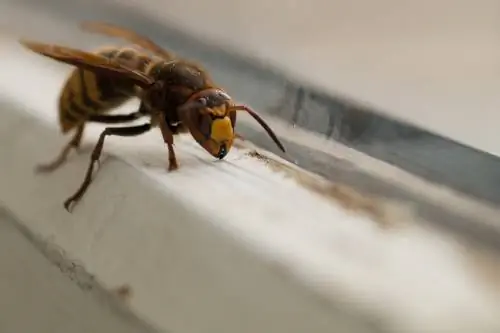
Hornets looking for food sometimes get lost in the house
Hornets get lost in the apartment more often, especially in spring, because at this time the hornet queen is busy looking for food as well as a suitable place for her nest. But even over the course of the summer, one or two animals can disappear, for example because they perceive an irresistible scent in that direction or are attracted to a light source in the dark. Prevent such wanderings by installing insect screens on windows and doors and cultivating plants that are unpopular with hornets on the window sills. Once the hornet is in your own four walls, you can get rid of it as follows.
Capturing hornets - this is how it works
Basically, catching hornets is not permitted according to the Federal Nature Conservation Act, which is why you are actually not allowed to lend a hand. Sometimes, however, there is no other option and the animal has to go out again as soon as possible. Be careful not to harm it and then release it back into the wild. However, vacuuming up with a vacuum cleaner, hunting with a fly swatter or any other aid with the aim of killing the insect is strictly prohibited.
With glass and cardboard
This old trick has proven itself on many occasions and helps to capture stray hornets without harm and then release them back into the wild. And this is how it works:
- Take a transparent glass or a corresponding plastic cup.
- You will also need a piece of cardboard or thick paper to cover the bottom of the glass.
- Have everything ready and wait until the hornet has settled on a surface that is easily accessible to you.
- Now approach slowly and with careful movements.
- Once you have reached the spot, quickly place the opening of the glass over the insect.
- Now push the cardboard or paper under the opening so that it is now covered.
- Take the jar, cardboard and hornet outside.
- Release the animal into the wild.
Light trap
If the hornet gets lost in the living room when it's dark outside, use this trick to scare it back out: Turn off all light sources in the apartment, open the windows completely and turn on the lights in front of them - but from outside - a lamp on. The animal will follow the light and find its way out again on its own. Naturally, this works best in an apartment on the ground floor or one with a balcony.
Excursus
Caution: wasp traps also attract hornets
Wasp traps are available from specialist retailers, which usually work with an attractant and also attract hornets - after all, these are also a type of wasp. However, electric traps that attract animals using UV light and then kill them with an electric shock are prohibited for private users. If you are caught using such a device in the garden, you could be fined very heavily. The same applies if you are only targeting “normal” wasps: These are also protected and may not be killed or controlled in any other way.
So that it doesn't even get to that point: prevent nest building
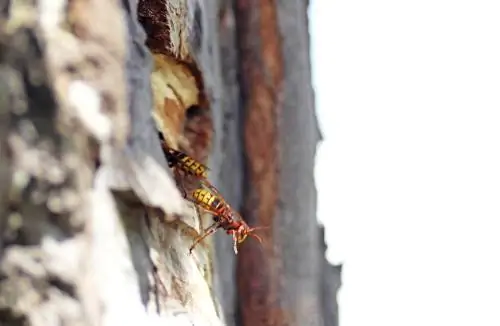
A hornet's nest can be prevented if it is still in its early stages
However, the best way to stop a summer hornet plague is to prevent nest building in the spring. You are not allowed to remove a nest that has already been built without official permission, but you can prevent the queen from building it. From April onwards, keep a close eye on vulnerable areas such as tree hollows, roller shutter boxes, wooden houses in the garden, etc.: If a single hornet keeps flying in and out there, it is probably the nest-building queen. Wait until it flies out and close the flight area with a densely meshed insect net, construction foam or another impermeable material.
Removing a hornet's nest - Can you do it yourself?
Unless you are a beekeeper, you are not allowed to remove a hornet's nest yourself. In any case, you need official permission for such a project, which you can apply for, for example, from the lower nature conservation authority in your region. However, it is only granted in exceptional cases and if there is an actual danger from the hornets. If you are granted permission, commission the local fire department, a certified pest controller or a beekeeper to carry out this task. You will bear the resulting costs yourself.
Relocating a swarm of hornets - is that possible?
The nest and the hornets living in it will not be destroyed, even if it is officially removed, but will simply be relocated. What you can try yourself, perhaps because the hornets have built their nest near the terrace, is to get the animals to move themselves. To do this, hang a hornet box near the nest and prepare it with attractants. With a little luck (and as long as it is early enough in the year and the construction of the old nest has not progressed too far!), the hornets will settle there and can be moved to a slightly cheaper location.
Excursus
Do not spray hornets
Many anxious people are tempted to spray the hornet with insect spray or hairspray and thus drive them away or kill them. This is prohibited according to the Federal Nature Conservation Act and should therefore be avoided - especially since hairspray in particular sticks the animals' wings together so that they can no longer fly and therefore starve miserably.
Frequently asked questions
Are hornets aggressive?
Hornets are big and look dangerous, but they are not. As a rule, the animals avoid humans and flee rather than attack. The situation is different if they feel threatened and see no other choice than to attack: For example, because you smoke out their nest, are even close to the nest (and possibly stand around in the flight path) or make hectic movements.
How dangerous is a hornet sting?
A hornet sting is painful, but no more dangerous than that of a bee or wasp.
Are hornets poisonous?
Hornet poison is no more poisonous than that of a wasp. Quite the opposite: most of the poison is transmitted even when a bee stings - these animals are much smaller.
Tip
Hornets are actually very useful animals that will keep all sorts of nuisances away from you. For example, the wasp population in a garden with a hornet's nest is much lower than where there are no hornets. So hang a nesting box for the giant wasps in a garden tree and do something good for the animals.

